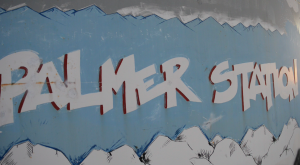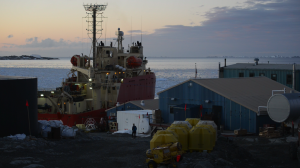No one had ever looked more comfortable in someone else’s office than Oscar Schofield. Sitting in front of the camera across from me in worn out jeans and a floral, Hawaiian-print shirt, he seemed more like a weather-beaten sailor on shore-leave than he did a Rutgers professor and one of the world’s premiere oceanographers. However over the course of our interview, Oscar would explain that the two are n ot mutually exclusive.
ot mutually exclusive.
This past winter Oscar embarked on a three month research voyage to a legendary facility known as Palmer Station: a fully-outfitted scientific research laboratory in one of the harshest, most remote locations on the planet – Antarctica. For those working in marine and climate sciences, Palmer Station is the Holy Grail – some will spend their entire careers preparing, just to get out there for a couple months, if that. Oscar casually refers to it “a summer camp for nerds” – it was a trip he had taken many times before, and is likely to take many times again.
Oscar spoke to us in depth about the life of a scientist at Palmer Station – with a total capacity of around 30 people during the summer months, including scientists and support staff, the Palmer family is closely knit to say the least. Until the moment they go to bed, from the moment they wake up they are working non-stop, and without a sunrise or sunset in the Antarctic Circle they can work for a long time. Oscar even tells us that in the “Wild West” days of Palmer, back in the 70s, there were incidents of people losing their minds and trying to kill their fellow scientists. These days though everyone must submit to psychological evaluations before getting the confirmation to go to Palmer, something that Oscars says, in his offhand way, “is probably a good thing.”
Yet in those rare moments of free time, Oscar tells us you get to see just how much of a shipboard, sailor-culture lifestyle these scientists down at the station really live. There were people who’d try their hand at whittling and scrimshaw – the intricacy in some of these carvings were incredible — and even some who’d go boating, cross-country skiing, and crevassing through the glaciers.
However, through all the work, all the jokes, and all the globally significant climate research taking place in Antarctica’s Palmer Station, being away from his family in New Jersey clearly takes the hardest toll on Oscar. Still they support him, because they know Oscar is going to continue sailing down to the bottom of the Earth to continue his research. No matter what.
